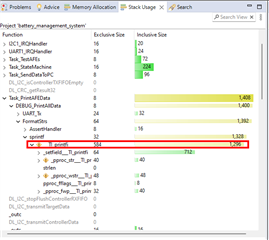Other Parts Discussed in Thread: MSPM0L1305
Tool/software:
Hi,
Background:
I am currently developing a firmware using CCS1271 with a custom board which features an MSPM0L1305 microcontroller.
As shown in the snapshot below, a function that calls the sprintf() function multiple times potentially takes up too much stack space and the moment it overflows, variables residing in other sections get corrupted resulting in the program failure.

Question:
I have been looking into the previous Q/A's relevant to this topic in this forum and it looks like others have already gone through similar issues. I came down to the following two potential solutions:
- Increase the stack size
- Use --printf_support=minimal
@Ki provided a detailed guideline regarding increasing the stack size (CCSTUDIO: Changing stack size through "Properties > Arm Linker > Basic Options" doesn't seem to work), and now I am having trouble finding the place to set "--printf_support=minimal" option in my environment. I went through every single menu in the project properties but couldn't find where to set it.
I also found the following information which may be implying that I don't have the option to control the "--printf_support" setting.

Can anyone share some insights into this?
My goal is to try and see if setting the option "--printf_support" to "minimal" would significantly decrease the inclusive size of stack usage and prevent stack overflow.
Thank you,
Kyungjae Lee

